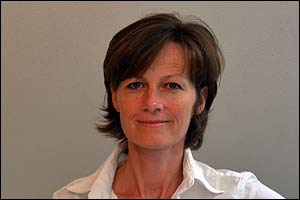
Wet Socks at Night
The no-dryer life has its rewards
By Madeleine von Holzen
 |
We had been planning this half-a-year house exchange for months. Everything had been prepared, discussed, thought of. We had received a very complete house manual and done the same on our side. We managed to understand the oven, discovered with pleasure but astonishment the size of the fridge, found the correct remote control for the TV and even succeeded in opening the shed’s no-key lock. Everything was perfectly fine until a few days after the American family had arrived in our house and we got the terrible news: No more hot water was pouring out of our Swiss taps! Is the heater broken? How are we going to deal with that now, in full winter? What an awkward start in what was supposed to be a modern and well-maintained house!
Well, it happened to be much simpler: The boiler was empty. I got to wondering about us. We are a four-person family and they are only three so … are we dirtier? The Swiss are a bit manic about cleanliness. We have created schools for women to learn how to make their home sparkle perfectly (some still exist, to my great despair). So have we deviated from that straight path? I swear, we do wash. But we use less hot water than our American partners, at least we did before the house exchange.
When it is limited (the boiler works at night only), you get into trouble if you are not the last one and if you use all the water. So you learn to use less. Or, if you want the freedom of a no-risk bath: after the others. I admit that it sometimes does drive me mad not to be able, then, to get those last five minutes of burning water on my skin. But I do like being careful about our energy consumption.
What happened to our friends? Past the first shock and cold start, nothing. They never ran out of water after that, thanks to a sunny spring (we have solar panels on the roof as complement to warm the water) and because they were more careful. “A great lesson for our 13-year-old son, who thinks of the shower as his personal, stand-up Jacuzzi,” Sara, his mother, says.
Our two families live with similar values, trying to preserve the planet we are leaving to our kids. They probably eat more organic food and use bicycles more than we do. But our houses are built differently. We have very airtight insulation, an air heating pump and solar panels, both installed with financial help from the state. Of course, it’s not perfect, as you get more hot water when you would love to take icy showers, in summer! But it’s a first step. It did cost us extra money 15 years ago, but our electricity bill today is low. A few wars and a tsunami later, you appreciate not having to depend on fuel oil and very little on nuclear energy.
What else? We turn off the heating as soon as possible in spring (can be a hot debate) and get the chill out of the house on weekends with a wood stove. We turn the lights off when we leave a room and don’t leave it on over the front door at night like we often see here (are so many people waiting for visitors at 4 am?), have a strip for all the plugs to the TV stuff and turn that off when not in use (those are terrible phantom energy users), and don’t put ice in our drinks except in whisky (it is amazing to us that you can buy ice as easily as bread here!). Simple things. Oh yes, and we hang up our wet clothes. Of course we love the convenience of our dryer here. But seeing the fluff coming out on the other side of the wall, we can’t help wondering if it’s worth spending energy and money to destroy our T-shirts.
Statistics show that the average American consumes twice as much energy as the average Swiss. Today, Sara, my correspondent, says that she would install a complementary heater to get rid of the anxiety of no warm water if she had to go on living there (I can understand that), but got used to the no-dryer life. On our side, the real test will be the one of the wet pants: get our children to (help us) hang them up again once we’re back home and convince them that the planet is worth those few minutes more spent putting clothes on a cord. As Sara says, you can then let the air and time dry them for free! Isn’t that a great deal?
Madeleine von Holzen is a Swiss journalist living with her family for seven months in Eugene through a house trade.